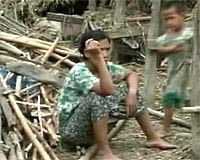| . |  |
. |
Bhopal, India (AFP) Dec 1, 2009 Laccho Bai's life has gone from bad to worse in the 25 years since the Bhopal gas tragedy, when fumes escaped from a pesticide plant in the central Indian city, killing thousands instantly. Huddled against the dirt floor of her home -- a shack of wooden planks propped against a brick wall with a tin roof -- a thin white mucus covers Laccho's eyes, the apparent result of exposure to more than 40 tonnes of methyl isocyanate gas that filled the neighbourhood on December 3, 1984. Like many other survivors living close to the Union Carbide facility, she and her family saw none of the multi-million dollar settlement package meant to help those affected. "People came and told us we could apply for compensation," Laccho's husband, Laxmi Narayan, said. "They took our name down, but we never saw a penny. The disaster killed between 8,000 and 10,000 people within the first three days, according to independent data by the state-run Indian Council of Medical Research (ICMR), and hundreds of thousands more still suffer from the effects of exposure to the fumes and contamination of land and water. In order to claim compensation, survivors had to prove their ailments -- including kidney problems, cancer and respiratory illnesses -- were actually caused by the toxic cloud that belched from the plant. "This was very hard for people who were poor and illiterate to hire lawyers, doctors and middlemen to go testify," said Rachna Dhingra, coordinator with the International Campaign for Justice in Bhopal (ICJB), an umbrella group of survivors' organisations. The Indian government, after initially demanding 3.3 billion dollars from Union Carbide -- purchased by Dow Chemical in 1999 -- agreed in 1989 to an out of court settlement totalling 470 million dollars which absolved the firm of any liability to clear up 350 tonnes of remaining toxic waste. A 2004 Supreme Court ruling ordered money left over from the settlement, and the interest accrued on it, be given to survivors, meaning many people received a second payment, or their first one ever. But the ICJB estimates at least 100,000 people received only interim compensation of 200 rupees (four dollars) per month immediately after the world's worst industrial accident, and never got any final lump sum payment. Many more received nothing at all, the result of red tape, corruption, and civil servants who rejected claim forms because names had been misspelled, said Dhingra. "The process itself was very flawed. There was absolutely no sympathy in the whole bureaucratic system," she said. "Judges were brought from all over the state and country and made a huge amount of money. They had no training to deal with people who had no proof to show they were victims," Dhingra added. Allegations of fake claims have also emerged over the years. "There are people who were not even in the area at the time but claimed to have been exposed so they got compensated," said Sanjay Verma, whose parents and five siblings died in the accident. Most of the victims who did receive compensation got 25,000 rupees (500 dollars) to fund a lifetime of hospital visits -- with the interim payment deducted from that sum. Relatives of those killed were paid an additional 100,000 rupees for each family member who died. "If we had received the money all at once I could have helped my family pay for medical treatment. We couldn't do anything with 200 rupees a month," said Aziza Sultan, who says she miscarried on the street while fleeing the site in terror and entered menopause at the age of 32 after being exposed to the gas. Verma -- who lost seven of his family -- considers himself lucky, having received 700,000 rupees after the 1989 settlement and once again after the 2004 case. But his remaining brother committed suicide in 2006 after a lengthy fight to see former Union Carbide executives prosecuted for their role in the tragedy. A handful of individual compensation cases linger in the state high court, brought by victims who felt they received inadequate compensation, but years of tireless legal battles have become the norm for residents. "People from Bhopal have already suffered a lot and really deserve a life of dignity," said Verma. "Even though they're illiterate and cannot study, they know what their rights are and they are fighting." Share This Article With Planet Earth
Related Links Bringing Order To A World Of Disasters A world of storm and tempest When the Earth Quakes
 World set for big drop in annual disaster bill: Swiss Re
World set for big drop in annual disaster bill: Swiss ReZurich (AFP) Nov 30, 2009 The global death toll and financial cost of catastrophes has dropped sharply this year after reaching near record levels in 2008, initial estimates from reinsurer Swiss Re indicated Monday. With one month of the year left, the total cost to society of natural and man-made disasters had reached 52 billion dollars (34.7 billion euros), about one fifth of the 267 billion dollars in damage ... read more |
|
| The content herein, unless otherwise known to be public domain, are Copyright 1995-2009 - SpaceDaily. AFP and UPI Wire Stories are copyright Agence France-Presse and United Press International. ESA Portal Reports are copyright European Space Agency. All NASA sourced material is public domain. Additional copyrights may apply in whole or part to other bona fide parties. Advertising does not imply endorsement,agreement or approval of any opinions, statements or information provided by SpaceDaily on any Web page published or hosted by SpaceDaily. Privacy Statement |